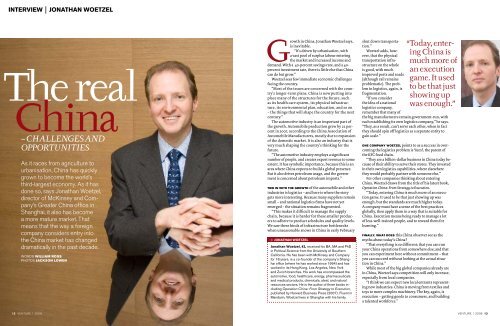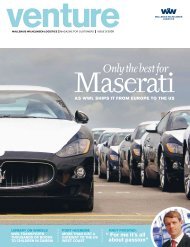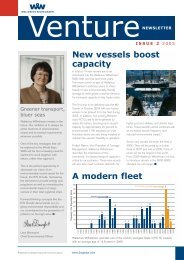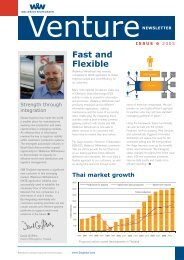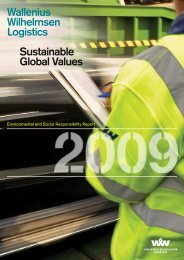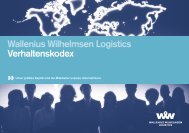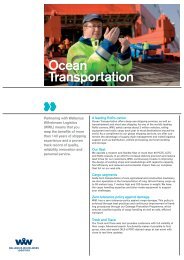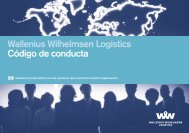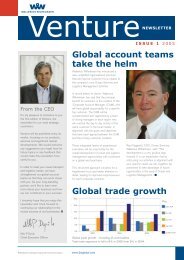DC GD69# 6I H:6# - Wallenius Wilhelmsen Logistics
DC GD69# 6I H:6# - Wallenius Wilhelmsen Logistics
DC GD69# 6I H:6# - Wallenius Wilhelmsen Logistics
Create successful ePaper yourself
Turn your PDF publications into a flip-book with our unique Google optimized e-Paper software.
in China, Jonathan Woetzel says,<br />
is inevitable.<br />
“It’s driven by urbanisation, with<br />
a vast pool of surplus labour entering<br />
rowth<br />
the market and increased income and<br />
demand. With a 40-percent savings rate, and a 40percent<br />
investment rate, there is little else that China<br />
can do but grow.”<br />
Woetzel sees few immediate economic challenges<br />
facing the country.<br />
“Most of the issues are concerned with the country’s<br />
longer-term plans. China is now putting into<br />
place many of the structures for the future, such<br />
as its health care system, its physical infrastructure,<br />
its environmental plan, education, and so on<br />
– the things that will shape the country for the next<br />
century.”<br />
The automotive industry is an important part of<br />
the growth. Automobile production grew by 22 percent<br />
in 2007, according to the China Association of<br />
Automobile Manufacturers, mostly due to expansion<br />
of the domestic market. It is also an industry that is<br />
very much shaping the country’s thinking for the<br />
future.<br />
“The automotive industry employs a significant<br />
number of people, and creates export revenue to some<br />
extent. It has symbolic importance, because this is an<br />
area where China expects to build a global presence.<br />
But it also drives petroleum usage, and the government<br />
is concerned about petroleum imports.”<br />
of the automobile and other<br />
industries is logistics – and here is where the story<br />
gets more interesting. Because many suppliers remain<br />
small – and national logistics firms have not yet<br />
emerged – the situation remains fragmented.<br />
“This makes it difficult to manage the supply<br />
chain, because it is harder for these smaller producers<br />
to adhere to product schedules and quality levels.<br />
We saw these kinds of infrastructure bottlenecks<br />
when unseasonable snows in China in early February<br />
<br />
<br />
<br />
<br />
<br />
<br />
<br />
<br />
<br />
<br />
<br />
<br />
<br />
<br />
<br />
<br />
<br />
<br />
<br />
<br />
<br />
<br />
<br />
shut down transportation.”<br />
Woetzel adds, however,<br />
that the physical<br />
transportation infrastructure<br />
on the whole<br />
is good, with much<br />
improved ports and roads<br />
(although rail remains<br />
problematic). The problem<br />
in logistics, again, is<br />
fragmentation.<br />
“If you consider<br />
the idea of a national<br />
logistics company,<br />
remember that many of<br />
the big manufacturers remain government-run, with<br />
each establishing its own logistics company,” he says.<br />
“They, as a result, can’t serve each other, when in fact<br />
they should spin off logistics as a separate entity to<br />
gain scale.”<br />
points to as a success in overcoming<br />
the logistics problem is Yum!, the parent of<br />
the KFC food chain.<br />
“They are a billion-dollar business in China today because<br />
of their ability to serve their stores. They invested<br />
in their own logistics capabilities, where elsewhere<br />
they would probably partner with someone else.”<br />
For other companies thinking about entering<br />
China, Woetzel draws from the title of his latest book,<br />
Operation China: From Strategy to Execution.<br />
“Today, entering China is much more of an execution<br />
game. It used to be that just showing up was<br />
enough, but the standards are much higher today.<br />
A company must have a sense of the best practices<br />
globally, then apply them in a way that is suitable for<br />
China. Execution means being ready to manage a lot<br />
of less-well-trained people, and to reward them for<br />
learning.”<br />
this China observer see as the<br />
myths about today’s China?<br />
“That everything is so different; that you can run<br />
your China operations from somewhere else; and that<br />
you can experiment here without commitment – that<br />
you can succeed without looking at the actual situation<br />
in China.”<br />
While most of the big global companies already are<br />
in China, Woetzel says competition will only increase,<br />
especially from local companies.<br />
“I think we can expect new local entrants representing<br />
new industries. China is moving from textiles and<br />
toys to more complex machinery. The key, again, is<br />
execution – getting goods to consumers, and building<br />
a talented workforce.”


